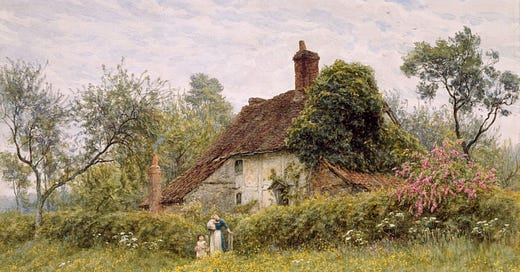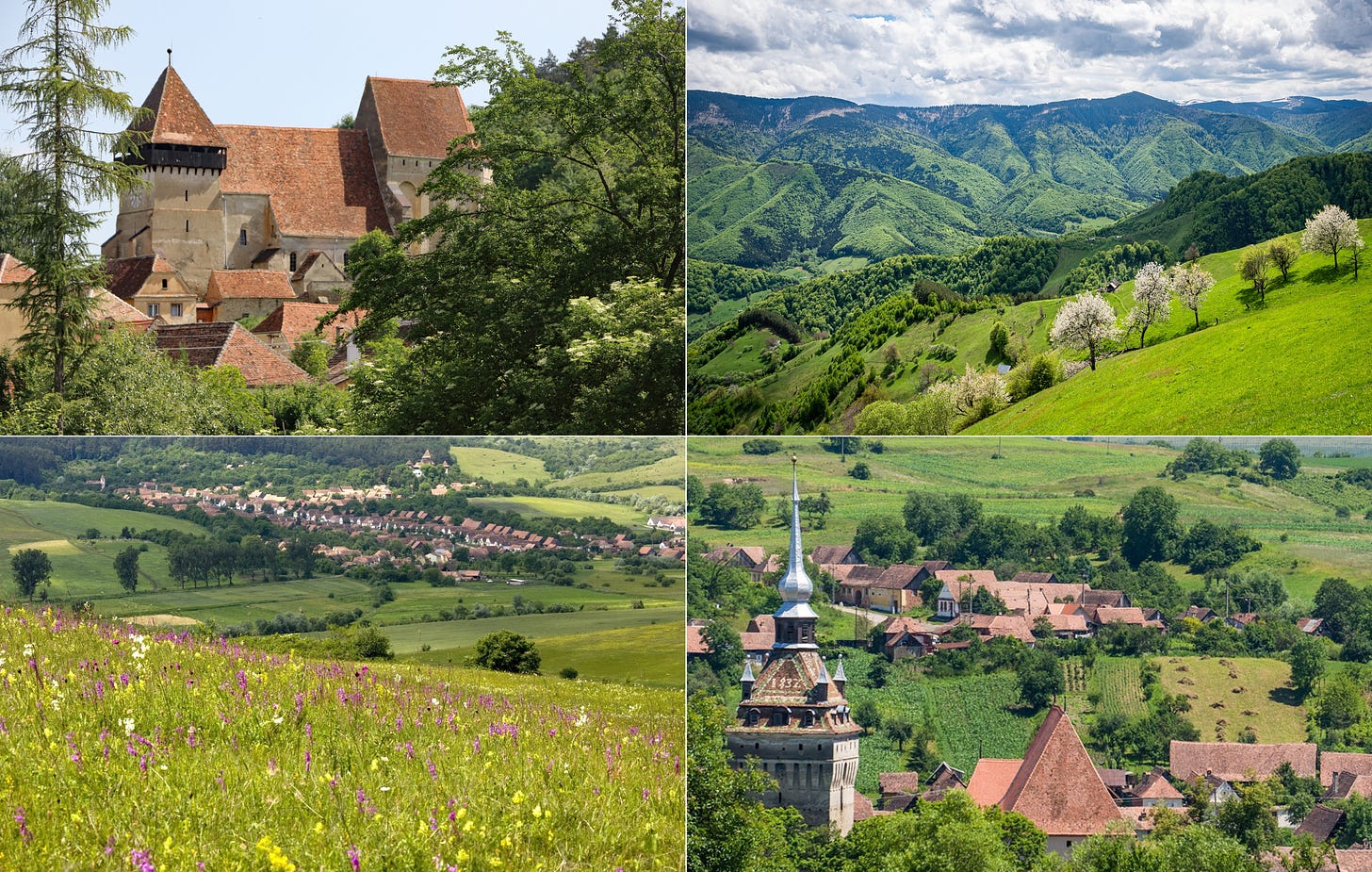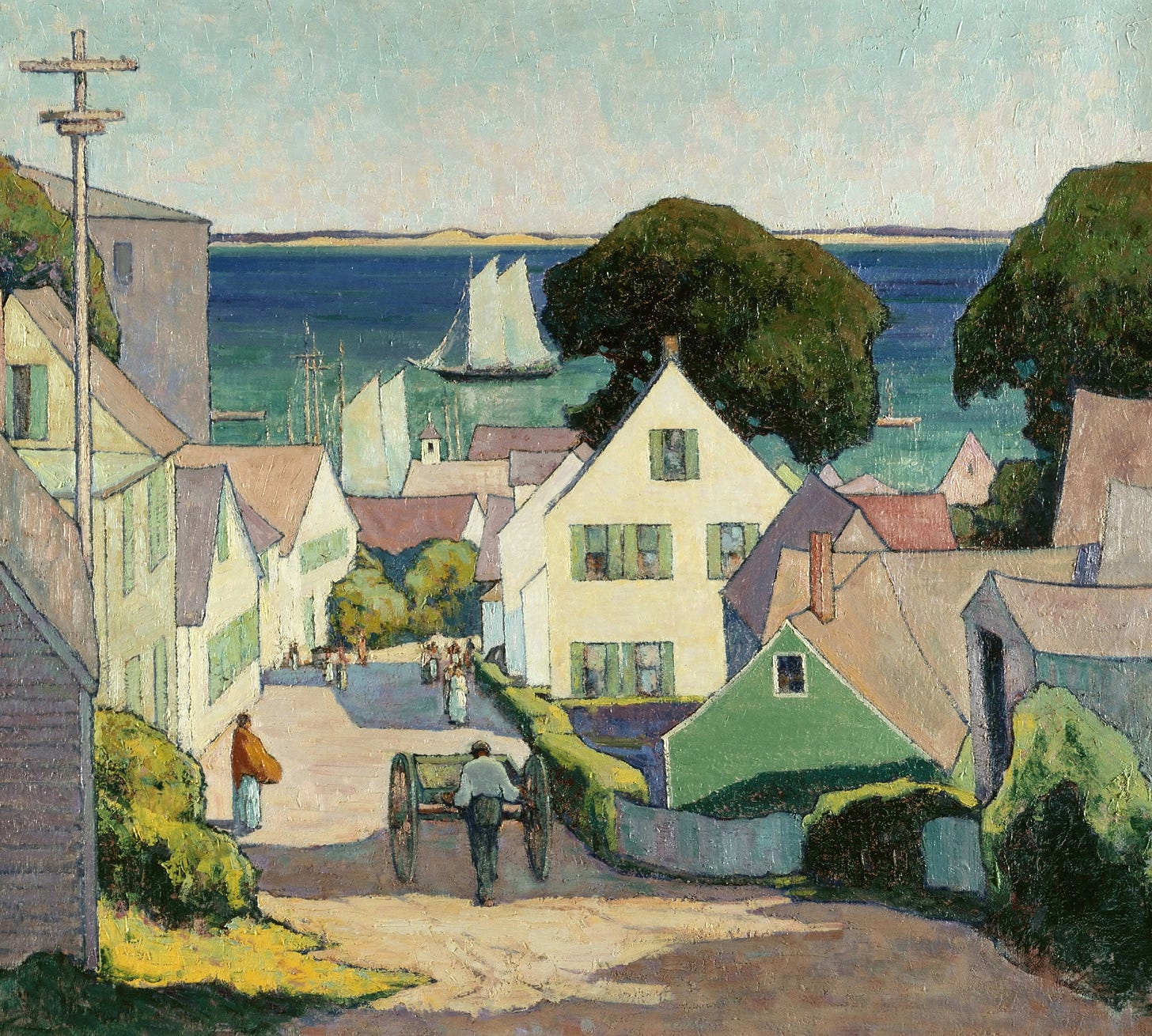THE REASON I CLIMB mountains and take long walks across the hills in Transylvania is not so much to admire nature as to get rid of my goals and ambitions for a while. To be spiritually mediocre means to be a city dweller who fails to be overwhelmed by nature, as it gracefully challenges you with a certain kind of pace or energy that feels completely alien.
Modernity fails to protect the environment simply because it considers nature valuable only insofar as it serves humanity rather than deeming it divine. Placing humans at the center of the universe is thus the ultimate expression of profanity, to paraphrase Nicolás Dávila. Taleb argues that God exists not to make people believe in God per se but to “prevent them from thinking they’re gods.”
The most famous problem of the last few centuries—the meaning of life—is an urban problem; a problem that “arises at crossroads or in moments of doubt, when the world rushes around you and you simply can’t find a reason for this frantic activity,” Emil Cioran wrote. The more you live in nature, the more this problem—and implicitly the need to justify your actions and complete your efforts—fades away, “replaced by a peaceful contemplation.”
You come to forget about your “problems” whenever you reach the peak of a mountain or stare obsessively at the ocean because you get to taste the eternal, the timeless, and thus internalize how your “problems” are nothing but temporary and banal tasks, paling into an obvious and comical insignificance. You may be able to articulate this truth after a corporate meeting or during a lunch break with friends, but it may feel cliché because it lacks the proper space to be conveyed; many truths are context-dependent.
To be antimodern doesn’t mean that you’re a nostalgic dreamer who yearns for an eradicated past; you’re simply trying to discover what’s sacred.
Cioran came up with yet another fascinating observation; if you take a look at archaic cultures—say, Indo-European cultures—which were developed in complete harmony with nature, being deeply rural, creation was a result of sculpture, craftsmanship, and different forms of plastic arts, while urbanized cultures promote creation through reason, abstract thinking, and metaphysics. “The former types of creation are maybe explained by a feeling of serene eternity; they’re expressions that deny temporality.” In primitive cultures, artistic creation therefore holds a character of transcendence. Now I understand what Lucian Blaga meant by “eternity was born in the village.” Rural cultures don’t understand what success means because success exists only in a far-fetched future, something you always strive for yet never achieve. Rural cultures are not spiritually configured to crave it because they’re anchored in a calm present that doesn’t allow them to get delusional.
Whoever reaches this stage of artistic creation has the right to declare they cracked the meaning of life without trying to crack it; as they’re designed to care less about regrets and welcome lasting joys into their life. My bet is that, paradoxically, only such artists can bend the odds to make history and build a legacy that bears their name.
On a related note, the only acceptable reason to become a writer is to embark on a therapeutic journey; to free yourself from obsessions. Everyone who writes because they want to “educate” others—even though they educate others—will fail miserably, even if they become best-selling authors. My friend,
, agrees with me: “We write to work through our confusion, unite spiritual knots, and solve existential crises.” CS Lewis put it best: “We write not to be understood but to understand.”The worst “artists” are those who only create mechanically and methodically, and now with the rise of AI, many of them will get exposed. On the flip side, this must be a call to action for real artists to have more courage! The competition for true art is getting a lot easier.1
Artists who rely too much on systems, models, templates, apps, tactics, and frameworks lack spiritual depth and genuine curiosity. As soon as your reason becomes the CEO of your projects—instead of being just another employee—your inspiration will get fired. Your work will lack energy, wit, and passion. Artists who mastered the elegance of taking action when inspiration strikes (and of educating inspiration to show up predictably and generously) also boast an arsenal of systems, templates, and frameworks. Yet these are not the guardians of their craft; they’re simply some casual friends.2
Can you even imagine the likes of Montaigne, Dostoevsky, Mozart, Vivaldi, Monet, Van Gogh, or Matisse relying on the Pomodoro technique? Do you believe Roger Scruton would have used AI to “improve” his writing? What are the chances that Rory Sutherland’s book, Alchemy—where humor, rizz, and personality explode through the page—is so great thanks to a bunch of templates and tactics he religiously abided by?
Overleveraging systems to write makes your prose feel lethargic. This is what my gut tells me after I read anything by Robert Greene or Ryan Holiday—Ryan used to work with Robert. I admire them as researchers, but not so much as writers. Their writing is unduly robotic, mechanized, and predictable. There’s a clear structure that mathematically flows through their books. And now, with the rise of AI, I expect to come across more such books. In contrast, pick any book written by Nassim Taleb or Alain de Botton—see how playful their writing feels.
To be continued…
I can’t write mechanically. From a professional perspective, I’m a very bad writer. If you force me to write every day from 9-5, I will write plenty of BS. Yet, sometimes, I feel possessed, I feel an internal effervescence, an electrifying force that guides me to my office in the attic where the magic (sometimes) happens. More than 80% of my writing is “produced” thanks to these moments of afflatus.
The point of writing/creation/art in general is to have fun and to keep it as human as possible. You want to use systems, templates, or AI to help you with your invoices, sending emails, drafting contracts—in other words, the profane aspects.







The god of Spinoza:
Stop praying and punching yourself in the chest!
What I want you to do is go out into the world and enjoy your life. I want you to enjoy, sing, have fun and enjoy everything I've made for you.
Stop going to those dark, cold temples that you built yourself and say they are my house! My house is in the mountains, in the woods, rivers, lakes, beaches. That's where I live and there I express my love for you.
Stop blaming me for your miserable life; I never told you there was anything wrong with you or that you were a sinner, or that your sexuality was a bad thing! Sex is a gift I have given you and with which you can express your love, your ecstasy, your joy. So don't blame me for everything they made you believe.
Stop reading alleged sacred scriptures that have nothing to do with me. If you can't read me in a sunrise, in a landscape, in the look of your friends, in your son's eyes... you will find me in no book! Trust me and stop asking me. Would you tell me how to do my job?
Stop being so scared of me. I do not judge you or criticize you, nor get angry, or seek to punish you. I am pure love.
Stop asking for forgiveness, there's nothing to forgive. If I made you... I filled you with passions, limitations, pleasures, feelings, needs, inconsistencies... free will. How can I blame you if you respond to something I put in you? How can I punish you for being the way you are, if I'm the one who made you? Do you think I could create a place to burn all my children who behave badly for the rest of eternity? What kind of God would do that?
Forget any kind of commandments, any kind of laws; those are wiles to manipulate you, to control you, that only create guilt in you.
Respect your peers and don't do what you don't want for yourself. All I ask is that you pay attention in your life, that your consciousness is your guide.
My beloved, this life is not a test, not a step, not a rehearsal, nor a prelude to paradise. This life is the only thing that exists here and now, and it is all you need.
I have set you absolutely free, no prizes or punishments, no sins or virtues... no one carries a marker, no one keeps a record.
You are absolutely free to create in your life heaven or hell.
I could tell you if there's anything after this life, but I won't... but I can give you a tip. Live as if there is nothing after... as if this is your only chance to enjoy, to love, to exist.
So, if there's nothing, then you will have enjoyed the opportunity I gave you. And if there is, rest assured that I won't ask if you behaved right or wrong, I'll ask. Did you like it? Did you have fun? What did you enjoy the most? What did you learn?...
Stop believing in me; believing is assuming, guessing, imagining. I don't want you to believe in me... I want you to feel me in you when you kiss your beloved, when you tuck in your little girl, when you caress your dog, when you bathe in the sea.
Stop praising me, what kind of egomaniac God do you think I am?
I'm bored being praised, I'm tired of being thanked. Feeling grateful? Prove it by taking care of yourself, your health, your relationships, the world. Express your joy!... that's the way to praise me.
Stop complicating things and repeating as a parakeet what you've been taught about me.
The only thing for sure is that you are here, that you are alive, and that this world is full of wonders.
What do you need more miracles for? Why so many explanations?
Look for me outside... you won't find me. Find me inside... there I am beating within you.
Spinoza.